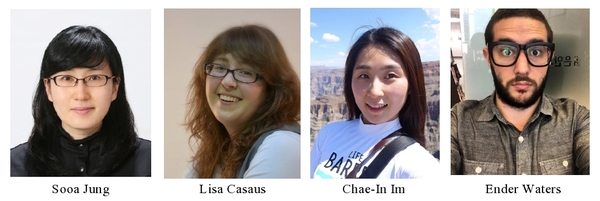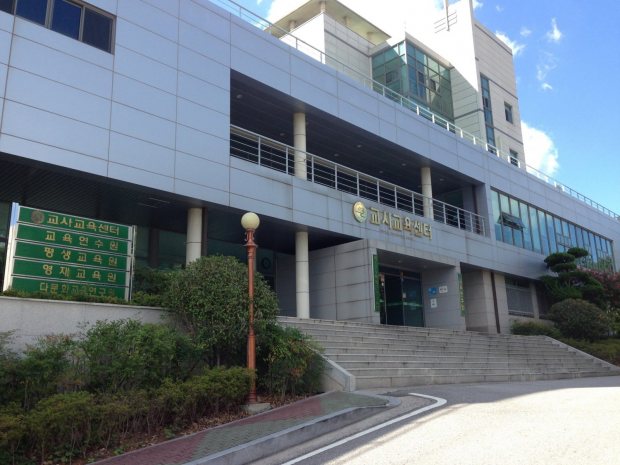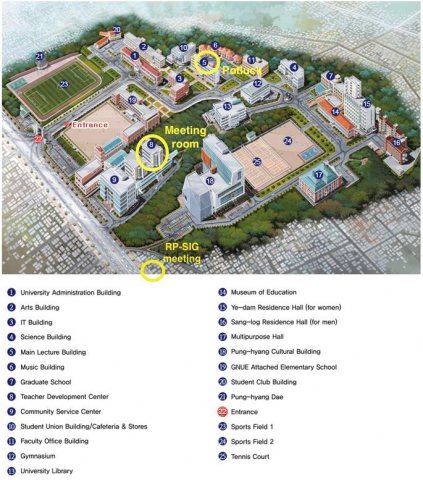
Gwangju-Jeonnam Chapter April Meeting
––– Morning Reflective Practice Session –––
Time: 11:00 am - 12:30 pm (2nd Sat., April 14)
Location: Coffee Lab Mujii, near GNUE. (Ground floor of 광주우리교회 Building. Map at bottom.)
ㅡ Topic: Translanguaging
ㅡ Facilitator: Bryan Hale
––– MAIN MEETING SCHEDULE –––
Time: 2nd Saturday, April 14, 2018, 1:45 - 5:00 pm
Location: Gwangju National University of Education (GNUE), Teacher Training Center (교사교육센터) 1st Floor; Room 811. Detailed directions HERE.
1:45 pm: Sign-in and Meet-and-Greet (Admission: Free for newcomers. Membership welcomed.)
2:00 - 3:20 pm: Panel Discussion
ㅡ The Art of Co-teaching: Craft and Considerations
ㅡ Lisa Casaus, Soo-a Jung, Ender Waters, and Chae-In Im
3:20 - 3:40 pm: Refreshment Break
3:40 - 4:10 pm: Co-teaching Demostration
ㅡ The Art of Co-teaching: Craft and Considerations
4:20 - 4:45 pm: Swap-Shop Presentations
Share your Teaching Ideas, Classroom Activities, and Teaching Wisdom with the group.
(Everyone is encouraged to share [up to 5-6 min. each]. Short tidbits are welcomed. Handouts also welcomed.)
4:45 - 5:00 pm: Announcements / Drawing for Door Prizes / Closing

Session Summary
.
The Art of Co-teaching: Craft and Considerations
.
Co-teaching is ripe with possibility, but it can also be challenging. How can we foster successful co-teaching relationships? This session will include a panel discussion as well as a demonstration of successful co-teaching techniques.
Many public school English teachers in Korea have experienced co-teaching: the pairing of two teachers—in this case, a native English speaker and a non-native English speaker—to teach a class together. Co-teaching, when done well, can result in engaging, energetic lessons; more opportunities for English input and output for students; students’ exposure to a different culture; greater support for students; easy modeling of dialogs or activities by co-teachers; and teachers teaching according to their own strengths (Carless, 2006). But how can co-teaching be implemented effectively? How can co-teachers plan, execute, and reflect on lessons in a positive and insightful way that builds on their respective strengths?
In an ideal co-teaching relationship, the two teachers complement each other. The native English speaker can offer cultural insights and increase students’ motivation to use English. Korean English teachers, on the other hand, might be more familiar with their students’ needs, local textbooks and exams, and government mandates, as well as the difficulties of learning English as a foreign language (Carless, 2006). Research shows that successful co-teaching relationships share certain traits: “sensitivity and goodwill” (Carless, 2006, p. 350) between the teachers; a good interpersonal relationship; selflessness and willingness to compromise; some perceived benefit for each teacher; complementary approaches; and respect for each other’s educational philosophies (Carless, 2006; Carless & Walker, 2006). But what does this look like in practice?
In this panel, experienced co-teachers will share tips and techniques, describing their process and discussing their relationship both in and out of the classroom. In addition, one pair will offer an excerpt from a lesson. Questions from the audience are welcome!
The Demonstration Lesson
This demonstration is based on the sixth-grade textbook lesson “Go Straight and Turn Right.” As an end-of-unit review, students will have already learned and practiced giving directions and will put their learning to use in a gap-share map activity. The co-teachers will model their class routines and explanation techniques.
THE PANELISTS

Lisa Casaus is from Albuquerque, New Mexico (USA). She teaches English at Pungam and Unli Elementary Schools in Gwangju. She has been in Korea since August 2016, before which she did office work and started her own illustration business, Baby Onion Says Hello! Presently, she is using her characters to engage her fifth- and sixth-grade students and is storing up experiences and stories for later artistic use. She is always looking for ways to improve as a teacher and communicator.
Sooa Jung teaches English at Pungam Elementary School in Gwangju. Since 2015, she has taught grades five and six with a big smile and is currently teaching grades three and four with lots of laughter. During her time at Pungam, she has had the chance to work with three different English native-speakers from the United States and South Africa.
Ender Waters was born in Greenville, South Carolina, but grew up in Melbourne, Australia, a fact that confused him as a child and continues to confuse him as an adult. He holds a BFA in film production and a BA in English from Azusa Pacific University in Los Angeles, California, and has been teaching English in Gwangju at Munhwa Elementary School and Hyodong Elementary School for almost three years.
Chae-In Im teaches at Gwangju Hyodong Elementary School.
References
Carless, D., & Walker, E. (2006). Effective team teaching between local and native-speaking English teachers. Language and Education, 20(6), 463-477. Retrieved from http://hdl.handle.net/10722/57350
Carless, D. R. (2006). Good practices in team teaching in Japan, South Korea, and Hong Kong. System, 34, 341-351. DOI:10.1016/j.system.2006.02.001
___________________________
Reflective Practice Session Summary
.
Translanguaging
.
What is "translanguaging"? What are the boundaries we maintain between languages, and why? What happens when we stop maintaining these boundaries? What translanguaging are we already doing, inside and outside of classrooms? After reflecting on translanguaging, are there changes to our teaching we plan to make?
 Session Facilitator: Bryan Hale
Session Facilitator: Bryan Hale
___________________________
Photo: The Gwangju National University of Education (GNUE / 광주교육대학교), Teacher Training Center (교사교육센터), venue for our main meeting ㅡ 1st floor, Room 811.




